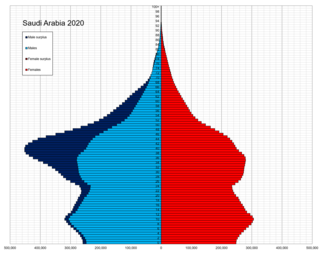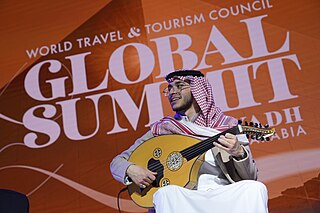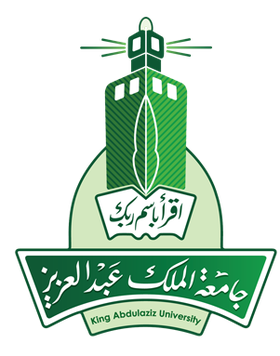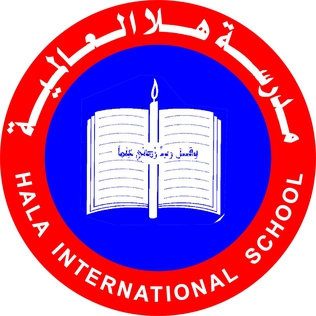
Saudi Arabia is the fourth largest state in the Arab world, with a reported population of 36,408,818 as of 2022. 41.6% of inhabitants are immigrants. Saudi Arabia has experienced a population explosion in the last 40 years, and continues to grow at a rate of 1.62% per year.

Jeddah, alternatively transliterated as Jedda, Jiddah or Jidda, is the largest city in Makkah Province, Saudi Arabia, and the country's second largest city after Riyadh, located along the Red Sea coast in the Hejaz region. Jeddah is the commercial center of the country. It is not known when Jeddah was founded, but Jeddah's prominence grew in 647 when the Caliph Uthman made it a travel hub serving Muslim travelers going to the holy city of Mecca for Islamic pilgrimage. Since those times, Jeddah has served as the gateway for millions of pilgrims who have arrived in Saudi Arabia, traditionally by sea and recently by air.

The music of Saudi Arabia includes both Western and traditional music. The most distinguished musician in recent Saudi history is Tariq Abdulhakeem, who composed hundreds of famous Saudi songs for himself as well as for other singers; Saraj Omar has become a very prominent composer after writing the music for the Saudi national anthem; Mohammed Abdu, dubbed the artist of the Arab world; Talal Maddah who died in August 2000 while singing in the summer festival on the stage of Al-Muftaha Theatre in the southern region of Saudi Arabia. The 1st Arab Pioneers Festival, which was held in Cairo under the patronage of the Arab League, honored four of the lead composers in Saudi Arabia: Tariq Abdulhakeem, Ghazi Ali, Mohamed Alsenan, and Mohammed Shafiq Chughtai. Of the same generation are the oud virtuoso Abadi al Johar, Rabeh Saqer and Abdul-Majeed Abdullah.

King Abdulaziz International Airport, is a major international airport serving the cities of Jeddah and Mecca in Saudi Arabia, located 19 kilometres (12 mi) north of Jeddah and covering an area of 112 square kilometres (43 sq mi). The airport is the busiest in the kingdom and the third-largest by land area. It is also one of the busiest airports in the Middle East. Opened in 1981, it was built to replace the now-demolished Kandara Airport and is named after the founder of Saudi Arabia, King Abdulaziz.

King Abdulaziz University (KAU) is a public research university in Jeddah, Saudi Arabia. Established in 1967 as a private university by a group of businessmen led by Muhammad Bakhashab and including author Hamza Bogary, it was named after the country's first monarch, King Abdulalziz ibn Saud. It was converted into a public university by King Faisal in 1974 and is ranked among the most prestigious academic institutions in Saudi Arabia.

Saudi Awwal Bank is a Riyadh-based Saudi joint stock company in which global banking group HSBC owns a minority stake. The bank traces its origins to the British Bank of the Middle East which was acquired by HSBC in 1959. In response to restrictions on foreign ownership of banks in Saudi Arabia, Saudi Arab British Bank (SABB) was created in 1978 to manage HSBC branches and assets in the country.

Saudi Arabia is the second biggest tourist destination in the Middle East with over 16 million visiting in 2017. Although most tourism in Saudi Arabia still largely involves religious pilgrimages, there is growth in the leisure tourism sector. As the tourism sector has been largely boosted lately, the sector is expected to a significant industry for Saudi Arabia, reducing its dependence on oil revenues. This is proved as tourism sector is expected to generate $25 billion in 2019. Potential tourist areas include the Hijaz and Sarawat Mountains, Red Sea diving and a number of ancient ruins.

Filipinos in Saudi Arabia are migrants or descendants of the Philippines who live in Saudi Arabia. Saudi Arabia is currently the largest employer of Overseas Filipino Workers (OFWs), and has the largest Filipino population in the Middle East. Filipinos make up the fourth-largest group of foreigners in Saudi Arabia, and are the second-largest source of remittances to the Philippines.

The Haramain High Speed Railway, is a passenger railway serving the Mecca and Medina provinces in western Saudi Arabia. The 449.2-kilometre-long (279.1 mi) main line directly connects the Islamic holy cities of Mecca and Medina, via Jeddah and the King Abdullah Economic City. A 3.75-kilometre (2.33 mi) branch line provides connections to the King Abdulaziz International Airport in Jeddah. It opened to the public on 11 October 2018.
Saudi Arabian art is contextual to the country being the birthplace of Islam; it includes both the arts of Bedouin nomads and those of the sedentary peoples of regions such as the Hejaz, Tihamah, Asir and Najd.

Pakistanis in Saudi Arabia are either Pakistani people who live in Saudi Arabia after having been born elsewhere, or are Saudi Arabian-born but have Pakistani roots. By Pakistani roots, this could mean roots linking back to Pakistan or Pakistani diaspora or South Asia. Many Pakistani army officers and soldiers also serve in Saudi Arabia and train the Saudi military cadets. According to a 2023 estimate, 2.64 million Pakistanis live and work in Saudi Arabia.

King Abdullah Sports City, also nicknamed The Shining Jewel or simply The Jewel, is a multi-use stadium and sports city located 30 kilometers north of Jeddah, Saudi Arabia. The city was named after Abdullah, King of Saudi Arabia when the stadium opened.
The national federation was created in 1956 and became a FIFA affiliate in 1956. However women's football is not included in the country's FIFA coordinated Goals! project. By 2011, inside the Saudi Arabia Football Federation, there has been an effort to create women's football programs at universities. Input had been sought on how to do this from other national federations including ones from the United States, Germany, Brazil and the United Kingdom.
Abdul Latif Jameel is a family-owned, diversified business founded in Saudi Arabia in 1945 by the late Sheikh Abdul Latif Jameel (1909–1993). Operating across seven core business sectors, Abdul Latif Jameel has a presence in over 30 countries across six continents.
The Riyadh International Book Fair (RIBF) is an annual book fair in Saudi Arabia. It lasts 11 days and regularly attracts over a half million visitors. The fair is used to showcase Saudi government policy, and it has been a locus of political power struggles with the government. Hundreds of publishers sell pre-approved books, and some black-market books. Writers take part in literary events. Invited speakers and the public discuss intellectual and social issues. Disagreements sometimes go beyond the bounds of debate, with speakers being shouted down and surrounded by protestors, and arrests of speakers and protestors; physical assaults are rare but not unknown.
Vice Admiral (rtd) Awwad Eid Al-Aradi Al-Balawi, the Director General of Saudi Arabian Border Guards till 20 Aug. 2020 and appointed as a member of the Shura Council on 2nd Sep. 2024. He was the chairman and the head of the scientific Committee of the 1st International Symposium for the safety and security of land and maritime borders in Jeddah. He was a member of the delegate of the Kingdom of Saudi Arabia to the International Maritime Organization IMO and represent the Kingdom as a Member of the Council and in the General Assembly of IMO. Vice Adm. Al-Balawi chaired several high-level meetings for the signatory states of Djibouti Code of Conduct which resulted in the adoption of Jeddah Amendments in 2017 as the Code was reviewed and expanded to include combating piracy and armed robbery of ships as well as illegal maritime activities in the western Indian Ocean and Gulf of Aden.

Germany–Saudi Arabia relations refers to the international relations between Germany and Saudi Arabia. Both countries have established a pragmatic partnership centered mainly on economic interests. Saudi Arabia is the second most important trading partner for Germany in the Middle East. The German government regards Saudi Arabia as a partner, as the country can be a moderating influence on radical forces in the Middle East conflict.

Hala International School (HIS) (Arabic: مدرسة هلا العالمية, romanized: Madrasah Hala al-ʿĀlamīyah) was a K–12 gender-isolated English-medium multicultural international school in the al-Aziziyah neighborhood of Jeddah, Saudi Arabia, active from 1991 to 2018 and served students across 24 different nationalities from the city, mostly the Pakistani diaspora.

Al Yasmin International School (AYIS) is a K–12 private foreign school in the al-Malazz neighborhood of Riyadh, Saudi Arabia. Established in 1999, the school offers Indian curriculum prescribed by the Central Board of Secondary Education and primarily serves the Indian diaspora.













